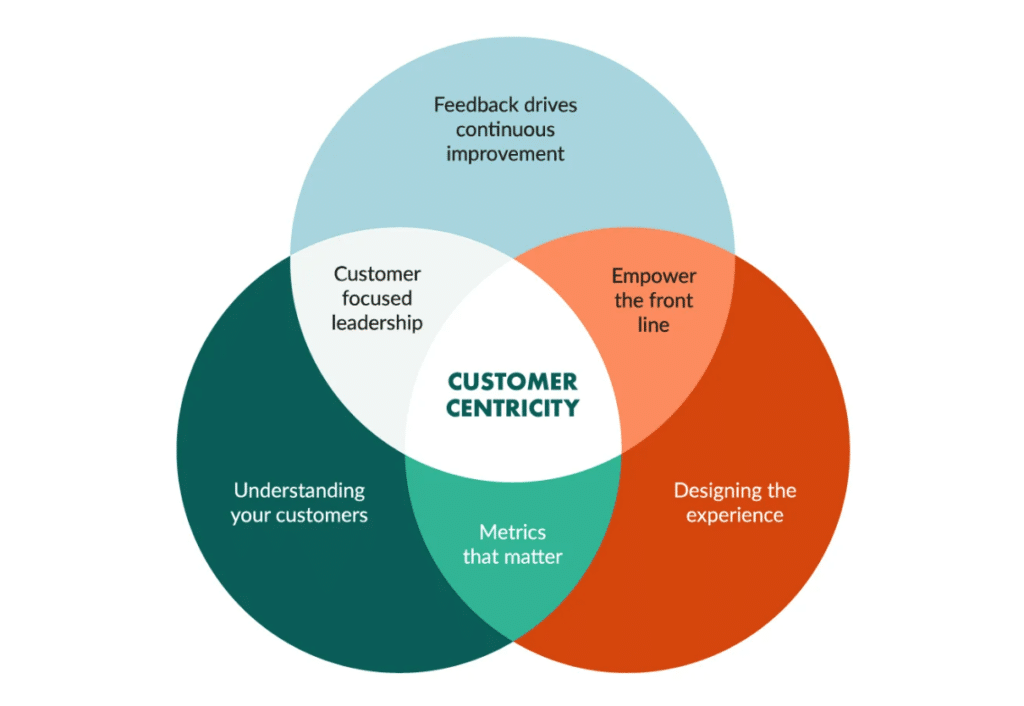In the competitive landscape of modern business, achieving customer-centric excellence is not just a goal—it’s a necessity for sustainable success. At the heart of this excellence lies Customer Relationship Management (CRM), a strategic approach that empowers businesses to prioritize customer needs, foster lasting relationships, and stand out in the market. This comprehensive guide explores the advantages of adopting CRM for customer-centric excellence and provides actionable insights for businesses aiming to leverage this powerful tool.

Understanding Customer-Centric Excellence and CRM
Customer-centric excellence goes beyond merely meeting customer expectations; it involves anticipating needs, providing personalized experiences, and building relationships that extend beyond transactions. CRM, as a philosophy and a tool, aligns seamlessly with this approach, placing customers at the center of business operations.
Advantages of CRM for Customer-Centric Excellence
1. 360-Degree Customer View
CRM provides businesses with a comprehensive, 360-degree view of their customers. This holistic perspective encompasses past interactions, preferences, and feedback, allowing businesses to tailor their products, services, and communication to individual customer needs.
2. Personalization at Scale
One of the key advantages of CRM is its ability to facilitate personalization at scale. By leveraging customer data, businesses can create targeted and personalized experiences, from marketing campaigns to post-purchase communication, fostering a deeper connection with customers.
3. Efficient Customer Interactions
CRM streamlines customer interactions by centralizing data and automating routine tasks. This efficiency ensures that businesses can respond promptly to customer inquiries, provide timely support, and deliver a seamless experience across various touchpoints.
4. Data-Driven Decision Making
In the pursuit of customer-centric excellence, data-driven decision-making is crucial. CRM systems provide actionable insights based on customer behaviors, preferences, and trends, empowering businesses to make informed decisions that align with customer expectations.
5. Enhanced Customer Retention
By understanding customer needs and delivering personalized experiences, CRM contributes to improved customer satisfaction and loyalty. The result is enhanced customer retention, a key metric for long-term business success.
Strategies for Achieving Customer-Centric Excellence with CRM
1. Define Clear Customer-Centric Objectives
Begin by defining clear objectives for achieving customer-centric excellence. Whether it’s improving satisfaction scores, increasing customer loyalty, or enhancing the overall customer experience, well-defined goals guide the CRM strategy.
2. Choose the Right CRM Solution
Selecting the right CRM solution is crucial for achieving customer-centric excellence. Consider factors such as scalability, integration capabilities, and user-friendliness. The chosen CRM system should align with current business needs and future growth plans.
3. Data Migration and Integration Planning
Ensure a smooth transition by planning data migration and integration with other business tools. Seamless data flow across systems ensures a unified approach to customer engagement and data management.
4. Employee Training and Adoption
Success in achieving customer-centric excellence with CRM relies on employee buy-in. Provide comprehensive training to ensure that teams across departments understand and leverage the CRM system effectively for customer interactions.
5. Continuous Optimization and Customer Feedback Integration
Regularly assess and optimize CRM strategies based on customer feedback. Customer-centric excellence requires a commitment to continuous improvement, ensuring that the CRM system evolves to meet changing customer expectations.
Common Myths and Realities about CRM for Customer-Centric Excellence
CRM is Only for Large Enterprises
The reality is that CRM is adaptable to businesses of all sizes. Modern CRM solutions offer scalability, making them suitable for small and medium-sized enterprises aiming for customer-centric excellence.
CRM is a Standalone Solution
While CRM is a powerful tool, its true potential is realized when integrated with other business systems. The reality is that CRM is a part of a larger ecosystem, enhancing overall operational efficiency and customer-centric strategies.
CRM Implementation is Costly and Time-Consuming
Contrary to the myth, CRM implementation can be efficient and cost-effective with careful planning and modern solutions. Cloud-based solutions have significantly reduced the time and resources required for CRM adoption.
Future Trends in CRM for Customer-Centric Excellence
AI-Enhanced Personalization
The future of CRM involves advanced AI-driven personalization. AI technologies will enable businesses to predict customer preferences and behaviors, allowing for even more sophisticated and tailored customer experiences.
Omnichannel Customer Engagement
Businesses will focus on creating a seamless, omnichannel customer experience. Integrating online and offline interactions will be crucial for providing a consistent and cohesive journey for customers.
Elevated Focus on Data Security and Privacy
As data security concerns grow, the future of CRM will involve an increased emphasis on securing and responsibly managing customer data. Businesses will prioritize compliance with regulations and building trust with customers.
Conclusion: Elevating Customer-Centric Excellence with CRM
In conclusion, achieving customer-centric excellence is not an option but a strategic imperative for businesses in the digital age. CRM serves as a powerful enabler, providing the tools and insights needed to prioritize customers, deliver personalized experiences, and build enduring relationships. By embracing CRM, businesses can unlock the full potential of customer-centric excellence and position themselves for sustained success in today’s competitive market.
FAQs
- Is CRM only suitable for large enterprises?
No, CRM is adaptable to businesses of all sizes. Modern CRM solutions offer scalability, making them suitable for small and medium-sized enterprises.
- Is achieving customer-centric excellence with CRM time-consuming and costly?
With careful planning and modern solutions, achieving customer-centric excellence with CRM can be efficient and cost-effective.
- What are the key advantages of CRM for customer-centric excellence?
Key advantages include a 360-degree customer view, personalization at scale, efficient customer interactions, data-driven decision-making, and enhanced customer retention.
- How does CRM contribute to enhanced customer retention?
By understanding customer needs, delivering personalized experiences, and fostering loyalty, CRM contributes to improved customer satisfaction and enhanced customer retention.
- What are the future trends in CRM for achieving customer-centric excellence?
Future trends include AI-enhanced personalization, omnichannel customer engagement, and an elevated focus on data security and privacy.